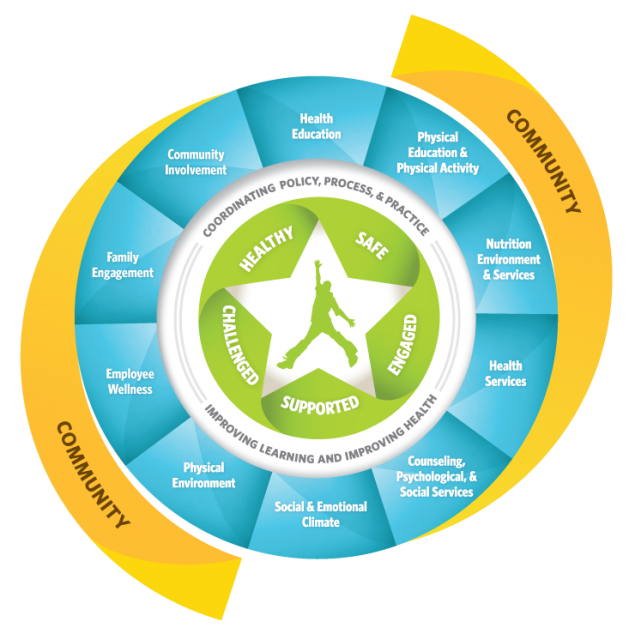It's a New Day in Public Health.
The Florida Department of Health works to protect, promote, and improve the health of all people in Florida through integrated state, county, and community efforts.
Healthy Schools (Coordinated School Health)
Contact the Coordinated School Health Partnership
- 850-245-4330
- cdprevention@flhealth.gov
-
Mailing Address
Bureau of Chronic Disease Prevention
4052 Bald Cypress Way Bin A18
Tallahassee, FL 32399
The Florida Department of Health (FDOH) and the Department of Education (FLDOE) have collaborated for over 20 years to promote implementation of the Centers for Disease Control and Prevention’s (CDC) Coordinated School Health (CSH) approach in all Florida Schools. CSH is an effective strategy to assist in the development and enhancement of state, district and school-based infrastructures that protect and maintain student and staff health and support academic achievement.
In 2013, the ASCD (formerly known as the Association for Supervision and Curriculum Development) and the CDC came together to develop the Whole School, Whole Community, Whole Child (WSCC) model. The WSCC model builds upon the traditional CSH model to emphasize greater alignment between health and educational outcomes.
Ten Components of the Whole School, Whole Community, Whole Child (WSCC)

The ten components of the (WSCC) model, when looked at in a coordinated manner, have been shown to be highly effective in facilitating the creation of policies and environments that provide students and staff the opportunity to reach their personal potential by removing health related barriers to academic success.
2. Nutrition environment and services.
3. Health education.
4. Social and emotional school climate.
5. Physical environment.
6. Health services.
7. Counseling, psychological and social services.
8. Employee wellness.
9. Community involvement.
10. Family engagement.
Supplemental Nutrition Assistance Program Education (SNAP-Ed)
In 2018, the Florida Department of Health received the Supplemental Nutrition Assistance Program Education (SNAP-Ed) funding from the United States Department of Agriculture through the Department of Children and Families. The funding is allocated to support county health departments in implementing SNAP-Ed programming. SNAP-Ed is an evidence-based program that helps eligible population lead healthier lives and teaches people about good nutrition and how to make their food dollars stretch further and learn to be physically active.
SNAP-Ed works by building partnerships with all types of community organizations. Communities have social marketing campaigns, hold nutrition education classes, and improve their policies, systems, and the environment of the community.
For more information, please visit:
Building a Healthy School District
CDC Healthy Schools Training Website
The CDC offers interactive training that will help you renew, refresh, and reinvigorate your team's efforts to improve the health and wellness of students and staff in your district. The material is based on the WSCC Model as a framework for addressing health in schools. It provides an opportunity for district wellness policy committees and School Health Advisory Committees (SHACs) to create a solid foundation to implement WSCC and enhance their wellness efforts.
The Training Tools for Healthy Schools focuses on Promoting Health and Academic Success. The e-Learning series consists of five core training tools that take approximately 1–1.5 hours to complete. The courses offer quizzes and printable certificates for each training topic that is completed. All five modules have a very robust "Go Further" section to gain additional knowledge and resources.
Tools and Resources for Building a Healthy SchoolDistrict School Health Advisory Committees (SHAC)
SHACs contain memberships from the ten components of the WSCC model, including the eight component areas of Coordinated School Health required by Florida statute. SHACs provide advocacy for school health and identify needs and opportunities to maximize community resources.
Florida School Health Advisory Committee Manual: This document is the Florida Department of Health approved guide to developing and conducting school health advisory committees.
School Employee Wellness Programs
Florida school districts are making tremendous strides toward creating healthy faculty and staff that are better able to educate our children, and reducing the burden of employee healthcare costs. Teachers, staff, and administrators can model healthy behaviors to students by consuming healthy foods and beverages, being physically active, and getting involved in the school’s employee wellness program. Learn more about Healthy School, Healthy Staff, Healthy Students, a guide to improving School Employee Wellness.
School Health Data
The Florida Departments of Health, Education and Children and Families partner to administer four surveys of student behavior through the Florida Youth Survey (FYS) effort. These surveys include:
- Youth Risk Behavior Survey
- Middle School Health Behavior Survey
- Florida Youth Tobacco Survey
- Florida Youth Substance Abuse Survey
The FYS is administered annually in the spring semester to a random sample of Florida public middle and high school students. In odd numbered years it is administered to a statewide sample of youth, to be representative at the state level. In even numbered years the sample is selected to be representative at the county (i.e. school district) level, providing data for local prevention planning.



Connect with DOH